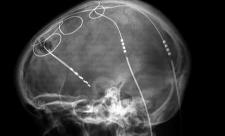To Err is Biotechnological: Reflections on Pew’s Human Enhancement Survey

Permit me a brief digression before I comment on the latest Pew Research Center survey of Americans’ attitudes toward biomedical technologies meant to “enhance” human performance.
I am married to a bioengineered man. Almost three years ago, after having been steadily eroded by Parkinson’s disease for over a decade, my husband Mark Derr braved deep brain stimulation (DBS) surgery. His incredible surgical team at Johns Hopkins implanted electrodes into his brain and a battery-driven stimulus device in his upper left pectoral, and the results seemed, at the time, nothing short of miraculous. With a mere incremental upping of the voltage during an initial adjustment session, the DBS instantaneously stilled Mark’s tremulous hand and foot, giving him relief that the standard drugs had only intermittently provided.
Much as DBS has improved his quality of life, Mark is far from cured. DBS cannot address the muscle stiffness, balance problems, and neurological pain he experiences daily. And the instrument requires constant attention. Mark’s days consist of frequent monitoring of his device; his weeks, of periodic adjustments of the voltage; his months, of consultation with his medical minders in Baltimore, where he travels every five months or so for “tweaking.” His latest technician there told him, “You are your own experiment.”
Based on direct experience, then, I would advise that heady promises regarding biotechnology should be viewed with a high degree of skepticism. DBS, for example, may eventually get better at addressing Parkinson’s symptoms, but cannot reverse the neuronal damage that lies at the base of the disease. Many other biotechnological interventions also carry with them an almost guaranteed set of deficits, inadequacies, inconveniences, and risks that are conveniently ignored in the valedictory narratives woven around them.
More profoundly, Mark both is and is not the Mark he was before DBS, and questions of how identity or even soul are altered by such technologies are only rarely addressed. (For excellent examples where they are, check out Françoise Baylis’s, “'I Am Who I Am’: On the Perceived Threats to Personal Identity from Deep Brain Stimulation” and Sherry Turkle’s edited volume, The Inner History of Devices.)
In some ways, the Pew survey, which looked at attitudes toward three hypothetical “enhancements” (although one, which would involve genetic enhancement of future children, is presented as a preventative medical measure), suggests that Americans get that biotech interventions raise profound social and ethical questions. In the chart below, more respondents said they were concerned rather than enthused about fiddling with babies’ genomes, following in the footsteps of Johnny Mnemonic, or engaging in blood doping squared. Not only did most of those surveyed expect that the cons would outweigh the pros of such interventions, a majority believed such interventions “could exacerbate the divide between the haves and have-nots in society…[and that] inequality would increase because only the wealthy could afford these enhancements.”

[Figure via Pew Research Center]
But Pew itself seems oddly disposed to undercut its own findings in the large accompanying piece probing “expert” opinion on enhancement in general. David Masci, in “Human Enhancement: The Scientific and Ethical Dimensions of Striving for Perfection,” seems to take the side of the pro-enhancement champions, giving ample play to the “sky’s the limit” point of view of self-avowed transhumanists and giving the final world to a futurist who says, “We’ll probably start by taking a human version of nirvana and creating it in some sort of virtual reality,” and then “we’ll transition to realms of bliss that we can’t conceive of at this time because we’re incapable of conceiving it.” Masci also strives to normalize enhancement, starting his piece with the claim that, “Human enhancement is at least as old as civilization.”
This claim, often advanced in pro-enhancement camps, suggests that education and exercise are equivalent to chips in the brain or performance enhancement through genetic alterations that would increase, say, fast twitch muscles. Call it argument by sleight of hand or by failure to make proper category distinctions. If we really want an accurate analogy, we should think about phase changes: water becomes colder and colder, and then becomes ice. A quantitative change leads to a qualitative change. Step by step, biotechnologists alter us; at a certain point, a qualitative change ensues. We cannot perfect the human; we can only push genes and protoplasm past a certain point—and no one quite knows where it lies, but many have agreed that the germline is certainly one clear and present possibility—and we will have crafted a new entity. But to what purpose is questionable.
Masci writes
Instead of leaving a person’s physical well-being to the vagaries of nature, supporters of these technologies contend, science will allow us to take control of our species’ development, making ourselves and future generations stronger, smarter, healthier and happier.
To this I say hooey and hooey again. Even the most exquisitely engineered of artifacts—take the Large Hadron Collider for example—are prone to error and screw ups. Surprise, chance, and unpredictability are hard wired into our universe. Whether breakdowns come from passing birds or wayward weasels, breakdowns will come. Even when our biomedical and bioengineering prowess achieves its best, there will always be downsides.
Gina Maranto is a fellow at the Center for Genetics and Society. She is Professor and Director of Ecosystem Science and Policy and Coordinator of the Environmental Science and Policy program at the University of Miami's Leonard and Jayne Abess Center. Her articles, opinion pieces, and reviews have appeared in Discover, The Atlantic Monthly, Scientific American, The New York Times, and other publications. She is the author of Quest for Perfection: The Drive to Breed Better Human Beings.
Previously on Biopolitical Times:
- False Inevitabilities and Irrational Exuberance
- Genetic Facts, Genetic Reality, Genetic Imaginaries
- “Moonshot Medicine”: Putative Precision vs. Messy Genomes
Image via Wikimedia



